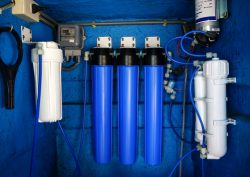How Often Should You Sanitize Your Commercial Water System?

Understanding the Importance of Water System Sanitization:
Commercial water systems are complex networks of pipes, faucets, fixtures, and other components that deliver water throughout a facility. Over time, these systems can accumulate various contaminants, including bacteria, mold, algae, and mineral deposits. If left unaddressed, these contaminants can adversely affect the quality and safety of the water supply. Regular sanitization of the water system is crucial to eliminate harmful pathogens and maintain water quality.
Determining the Sanitization Frequency:
The frequency at which you should sanitize your commercial water system depends on several factors, including the type of facility you operate, water quality, water usage, and local regulations. While there are no hard and fast rules, here are some general guidelines to consider:
1. Regular Maintenance Schedule:
It’s advisable to incorporate water system sanitization into your regular maintenance schedule. This ensures that the task doesn’t get overlooked or forgotten. Depending on the size and complexity of your water system, you may choose to sanitize it monthly, quarterly, or biannually.
2. Risk Assessment:
Performing a risk assessment can help determine the appropriate frequency for water system sanitization. Consider factors such as the vulnerability of your facility to waterborne pathogens, the susceptibility of your clientele (e.g., hospitals serving immunocompromised patients), and any past history of water-related issues. Engaging a professional water treatment specialist or consultant can be valuable in conducting a comprehensive risk assessment.
3. Water Quality Testing:
Regular monitoring of water quality is crucial in determining the need for sanitization. Conduct routine tests to check for indicators of contamination, such as bacterial presence, unusual tastes, and odors. If water quality tests indicate a decline in the water’s safety, immediate sanitization may be necessary.
4. Local Regulations and Guidelines:
Be aware of any local regulations or guidelines governing water system sanitization. These regulations vary by region and may stipulate specific requirements for different types of facilities. Consult with local health authorities, utility companies, or professional organizations to ensure compliance with any applicable regulations.
5. Unique Circumstances:
Certain circumstances may warrant more frequent sanitization. For instance, if your commercial facility experiences a water-related outbreak, such as Legionnaires’ disease, it’s essential to promptly sanitize the water system to eliminate the source of the contamination. Additionally, if there are any construction or renovation activities that could introduce contaminants, it’s advisable to sanitize the water system before resuming normal operations.
Considerations for Hiring Professionals:
While some commercial facilities may have in-house maintenance teams capable of sanitizing the water system, others may require the expertise of professionals. Hiring water purification professionals can provide the following advantages:
1. Experience and Expertise:
Professional water treatment specialists have the knowledge and experience to efficiently sanitize complex water systems. They understand best practices and can ensure that all necessary steps are taken to eliminate contaminants effectively.
2. Compliance:
Engaging professionals can help ensure compliance with local regulations and industry standards. They are well-versed in the specific requirements for different types of commercial facilities and can provide the documentation necessary to demonstrate compliance.
3. Efficiency:
Sanitizing a commercial water system can be a time-consuming and labor-intensive process. Professionals have the appropriate equipment, tools, and chemicals to expedite the sanitization process without disrupting your regular operations.
Conclusion:
Maintaining a clean and safe water supply is essential for any commercial facility. Regular sanitization of your water system is an integral part of ensuring optimal hygiene and preventing the growth and spread of harmful contaminants. The frequency of sanitization depends on factors such as your facility type, water quality, water usage, and local regulations. Regular maintenance schedules, risk assessments, water quality testing, adherence to local regulations, and consideration of unique circumstances can help determine the appropriate sanitization frequency. When in doubt, it’s advisable to consult with professionals who specialize in water treatment to ensure the effectiveness and safety of your commercial water system.
Got Questions? Let Us Help!
Categorised in: Commercial Water System
This post was written by admin